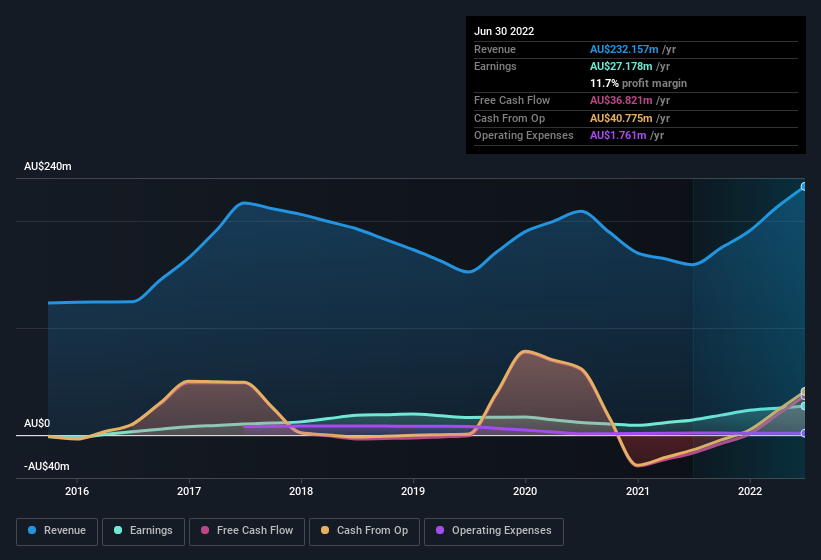Does Lycopodium (ASX:LYL) Deserve A Spot On Your Watchlist?
It's common for many investors, especially those who are inexperienced, to buy shares in companies with a good story even if these companies are loss-making. Sometimes these stories can cloud the minds of investors, leading them to invest with their emotions rather than on the merit of good company fundamentals. A loss-making company is yet to prove itself with profit, and eventually the inflow of external capital may dry up.
Despite being in the age of tech-stock blue-sky investing, many investors still adopt a more traditional strategy; buying shares in profitable companies like Lycopodium (ASX:LYL). Now this is not to say that the company presents the best investment opportunity around, but profitability is a key component to success in business.
View our latest analysis for Lycopodium
Lycopodium's Earnings Per Share Are Growing
Generally, companies experiencing growth in earnings per share (EPS) should see similar trends in share price. So it makes sense that experienced investors pay close attention to company EPS when undertaking investment research. Impressively, Lycopodium has grown EPS by 18% per year, compound, in the last three years. If growth like this continues on into the future, then shareholders will have plenty to smile about.
Top-line growth is a great indicator that growth is sustainable, and combined with a high earnings before interest and taxation (EBIT) margin, it's a great way for a company to maintain a competitive advantage in the market. On the one hand, Lycopodium's EBIT margins fell over the last year, but on the other hand, revenue grew. So if EBIT margins can stabilize, this top-line growth should pay off for shareholders.
You can take a look at the company's revenue and earnings growth trend, in the chart below. Click on the chart to see the exact numbers.
Since Lycopodium is no giant, with a market capitalisation of AU$261m, you should definitely check its cash and debt before getting too excited about its prospects.
Are Lycopodium Insiders Aligned With All Shareholders?
Seeing insiders owning a large portion of the shares on issue is often a good sign. Their incentives will be aligned with the investors and there's less of a probability in a sudden sell-off that would impact the share price. So as you can imagine, the fact that Lycopodium insiders own a significant number of shares certainly is appealing. Owning 40% of the company, insiders have plenty riding on the performance of the the share price. Shareholders and speculators should be reassured by this kind of alignment, as it suggests the business will be run for the benefit of shareholders. In terms of absolute value, insiders have AU$105m invested in the business, at the current share price. That should be more than enough to keep them focussed on creating shareholder value!
It means a lot to see insiders invested in the business, but shareholders may be wondering if remuneration policies are in their best interest. A brief analysis of the CEO compensation suggests they are. The median total compensation for CEOs of companies similar in size to Lycopodium, with market caps between AU$144m and AU$576m, is around AU$821k.
Lycopodium offered total compensation worth AU$690k to its CEO in the year to June 2021. That comes in below the average for similar sized companies and seems pretty reasonable. CEO compensation is hardly the most important aspect of a company to consider, but when it's reasonable, that gives a little more confidence that leadership are looking out for shareholder interests. It can also be a sign of good governance, more generally.
Should You Add Lycopodium To Your Watchlist?
You can't deny that Lycopodium has grown its earnings per share at a very impressive rate. That's attractive. If you still have your doubts, remember too that company insiders have a considerable investment aligning themselves with the shareholders and CEO pay is quite modest compared to similarly sized companiess. Everyone has their own preferences when it comes to investing but it definitely makes Lycopodium look rather interesting indeed. You should always think about risks though. Case in point, we've spotted 1 warning sign for Lycopodium you should be aware of.
Although Lycopodium certainly looks good, it may appeal to more investors if insiders were buying up shares. If you like to see insider buying, then this free list of growing companies that insiders are buying, could be exactly what you're looking for.
Please note the insider transactions discussed in this article refer to reportable transactions in the relevant jurisdiction.
Have feedback on this article? Concerned about the content? Get in touch with us directly. Alternatively, email editorial-team (at) simplywallst.com.
This article by Simply Wall St is general in nature. We provide commentary based on historical data and analyst forecasts only using an unbiased methodology and our articles are not intended to be financial advice. It does not constitute a recommendation to buy or sell any stock, and does not take account of your objectives, or your financial situation. We aim to bring you long-term focused analysis driven by fundamental data. Note that our analysis may not factor in the latest price-sensitive company announcements or qualitative material. Simply Wall St has no position in any stocks mentioned.
Join A Paid User Research Session
You’ll receive a US$30 Amazon Gift card for 1 hour of your time while helping us build better investing tools for the individual investors like yourself. Sign up here


